#i would like to see more of it please
Text
also i need more deets on the fact that when crowley and aziraphale try to collaborate on even the teeniest tinest miracle together they perform a miracle of intense magnitude that ‘only the mightiest of archangels could’ve performed’ like hi hello??
#like i thought at first that gabriel had contributed but that’s never confirmed and then in ep six crowley says ‘apparently when we perform#miracle together it all goes a bit too well’#i would like to see more of it please#good omens#j
4K notes
·
View notes
Text
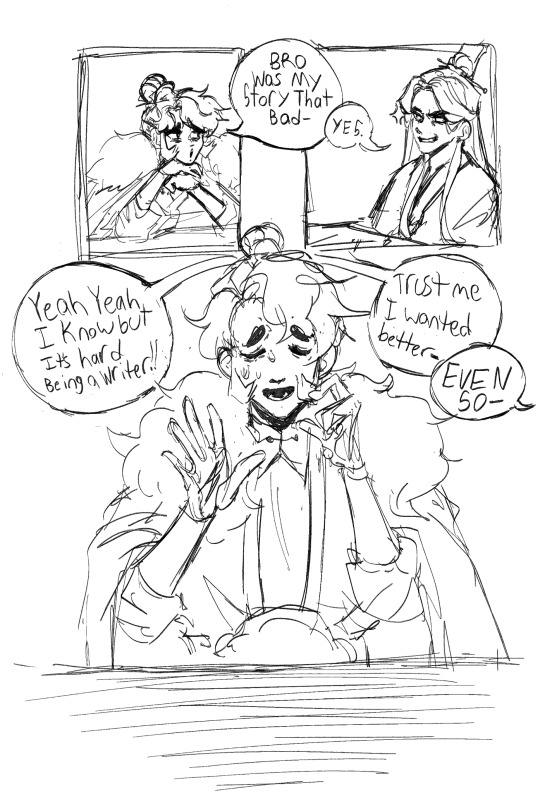
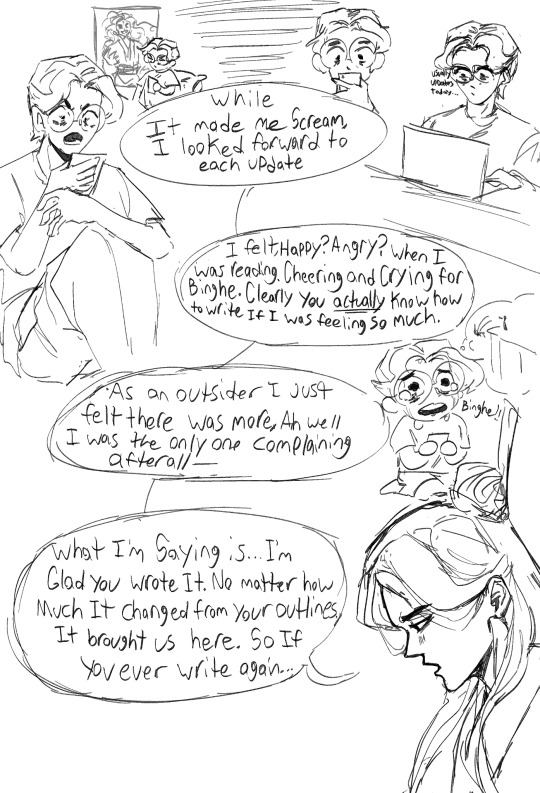
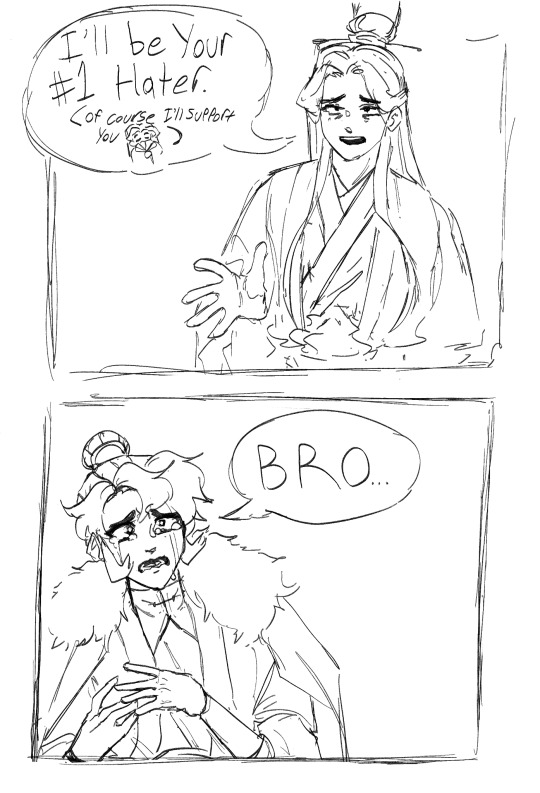
A writer and His number one fan hater
#svsss#shen qingqiu#shang qinghua#platonic cumplane???#Shen Yuan#scum villian self saving system#scum villains self saving system#scum villain's self saving system#scum villain#I actually have a lot of thoughts about them that i wasnt able to articulate right with words or drawings#i just think#That Shen Yuan really did like the story#like he was upset on behalf of a good character#he was upset about its potential#he absolutely wanted more for him and was upset that it was thrown away to please the masses#he had no idea what Shang Qinghua was going through#absolutely just ranked on him and YEAH IT WASNT THE BEST WORK BUT clearly it still was good enough to make Shen Yuan care#like ah#I would love to read more dynamics about them about a struggling writer and his most trusted hater to yell at him to write his heart out#also Shen Qingqiu going through svsss and seeing how much thought Shang Qinghua actually put into the story#and how much effort he actually had in it before he had to settle and scrap#like AAAAHH Im not the analysis type and my thoughts about them really are all other the place but really I think nothing is stronger then#an author and a reader#cause my man read to the very end the ABSOLUTE END#hE CARED HE CARED HE REALLY CARED NO MATTER HOWWWW MUCH HE CRIED ABOUT IT#alright dont look at me they make me go crazy#my art#nibbelraz
3K notes
·
View notes
Text
while i get where this comes from and it’s true to an extent, i reeeaaaally don’t like how people try to explain “trans men don’t [necessarily] have male privilege” with things like “some trans men don’t pass”.
like sure that’s the most obvious example (someone who is seen as a woman won’t have the privilege that comes with being seen a man) but you’re still acting like being a passing trans man is just a free opt-in to male privilege which is………kinda the issue.
#personal#ohh don’t be weird on my post please this is just on my mind#i’ve seen it so many times just in the last few days#like yeah a passing trans man receives more benefits than anyone who’s seen as a woman#and i’m sure most people making those arguments DO understand that it’s not that simple#but very few people engaging in these kinds of discussions in good faith would argue that someone seen as a woman has male privilege#(note: VERY FEW people engaging in GOOD FAITH)#i see people be like ‘everyone thinks all trans men pass’ and like…….WHO is thinking that who’s also gonna listen to you here#maybe it’s just my grew-up-in-a-conservative-religious-environment thing but your experience is not universal#i would also like you to consider whether ‘anyone that looks like a man has male privilege’ is consistent with your other views#1k#(oh god guys please)
3K notes
·
View notes
Text
Every day I’m haunted by the fact the boys happily swim in sewer water
Even if it’s filtered somehow there’s no way it’s not still nasty 😭 Bet they can defeat any of their villains just by accidentally giving them diseases I swear
#rottmnt#rise of the teenage mutant ninja turtles#bless their hearts but they’re nasty#it’s funny because like#each and every one of them has moments#where they’re a typical disgusting teenage boy#and then the next they have STANDARDS#can’t blame Leo for being so determined to go to a spa#even if he nearly licked his own foot that’s prob cleaner than anything else the boys have been up to in years 💀#thank you shelldon for all your hard work cleaning after then 🙏#they’re all gross teenage boys!!!#even Donnie he is NO exception here#bro was DRINKING A BEVERAGE while wading through sewer water he is just as gross as his bros#bro also talks with his mouth full he is no more refined than his equally gross bros fr and I love it#but yeah no way that water isn’t disgusting even filtering it would still leave grime on the walls of the sewer for yearsss#pros of them moving into an abandoned subway system is fixing their sense of smell enough to not be as gross#100% that’s part of why they didn’t mind being so filthy pre shelldon#because I mean they were literally raised in the sewers and they’re teenage boys like that’s a double whammy#THEY ALSO DONT WEAR SHOES#the few times any of them do the shoes are discarded before heading home 💀#I love them tho they are endearing anyhow#April’s immune system must be godlike just being around them fr#honestly no joke Mikey’s probably the cleanest of them all#just by virtue of being a chef#Leo I see as a mixture since he no doubt loves to pamper himself so he’s clean like#a percentage of time before he goes out and ruins his own hard work#Donnie is similar in that he’s just VERY SELECTIVE about what he thinks is too gross#Raph may be more on the stinky end but it’s not his fault he has his stinks and eats things of dubious origin(esp since his bros ate poison)#Donnie and Leo really have the gall to be sick about Raph eating the origami salami but they have no room to talk#all their villains are prob like please stay away from us we have salmonella now
587 notes
·
View notes
Text
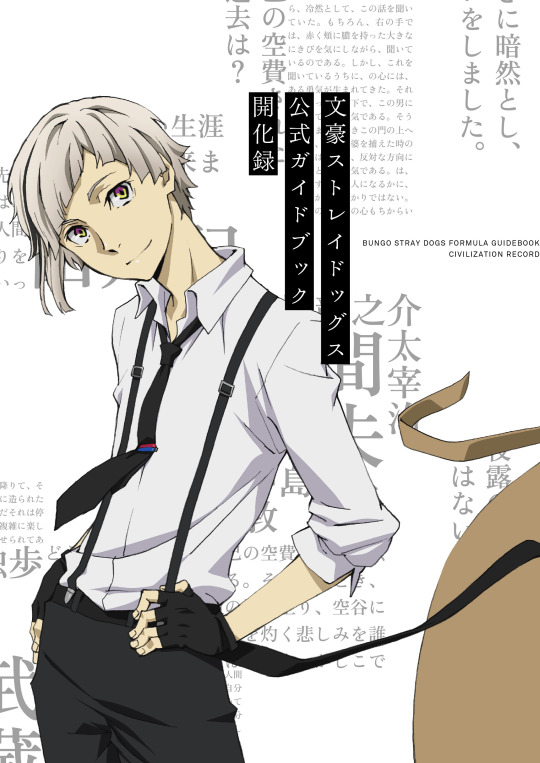
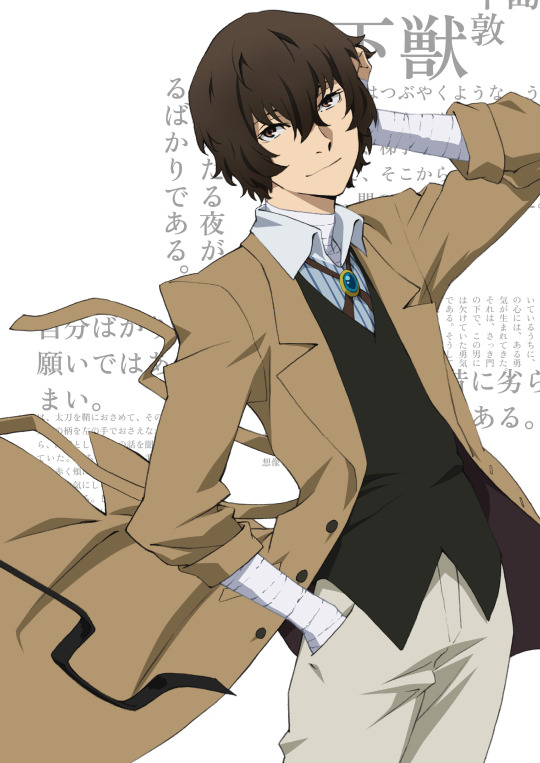
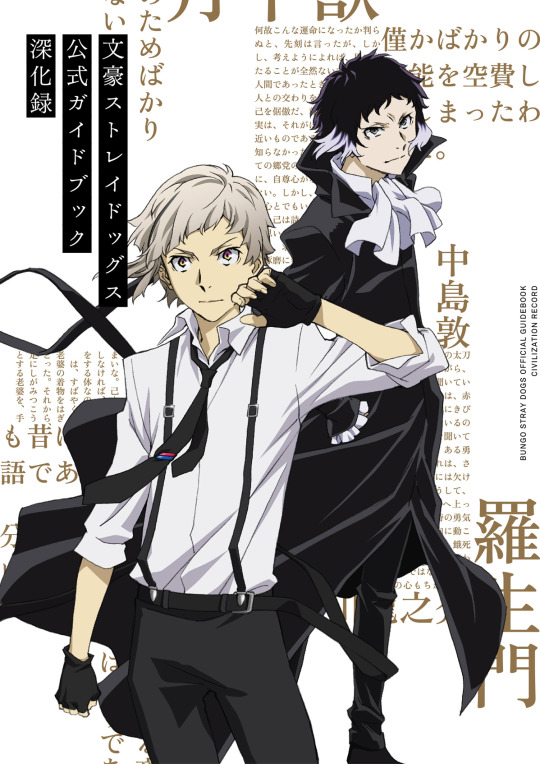
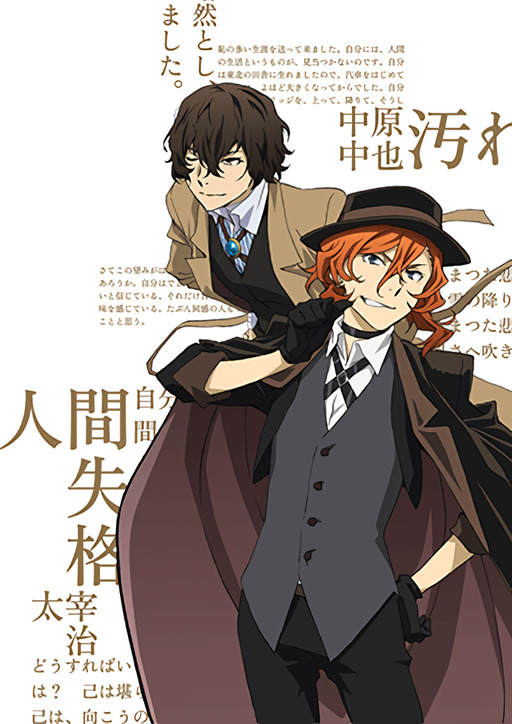
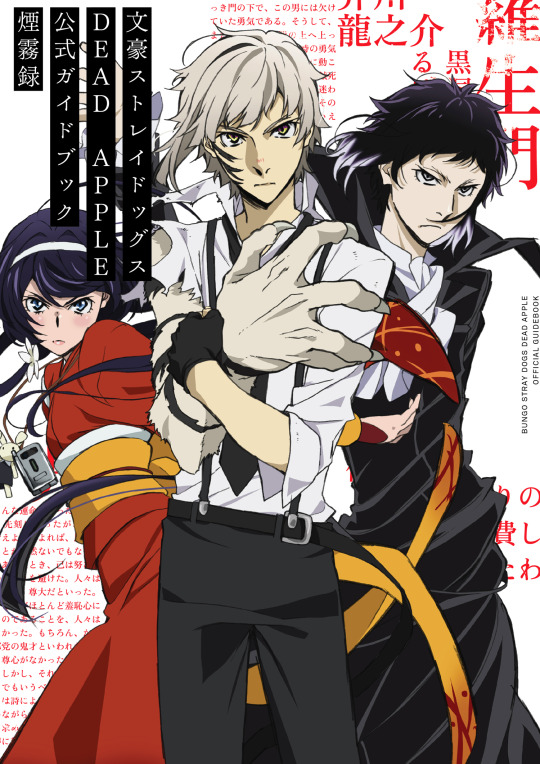

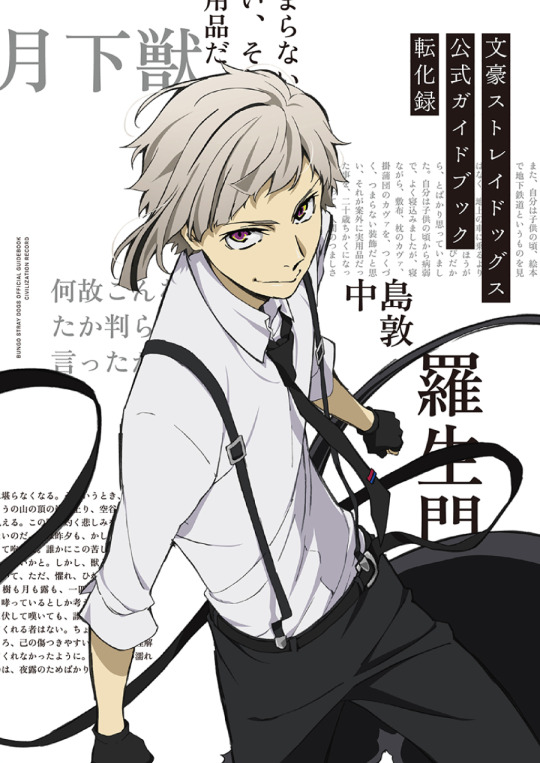
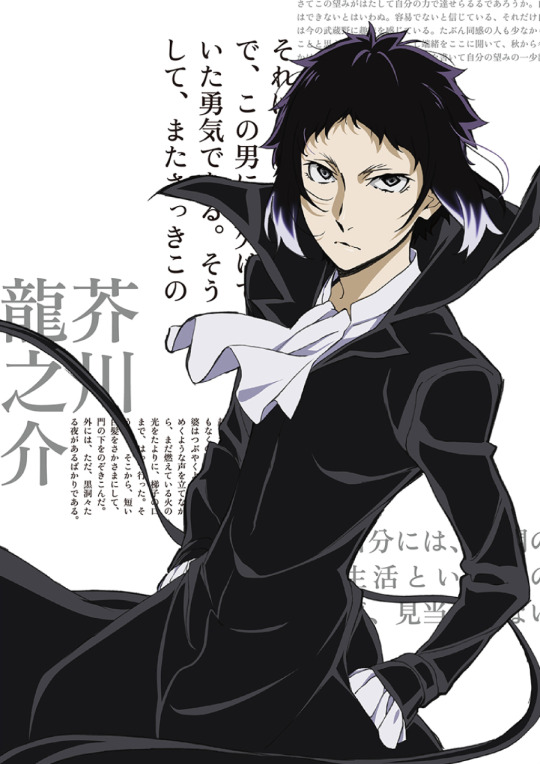


BUNGO STRAY DOGS ANIME GUIDEBOOKS
#Idk just wanted to put them all together. I was like “now that the fifth guidebook is out it would be nice to see them all together!#shouldn't take more than ten minutes” *cue to me taking two hours to find all the pictures in the best quality*#It's just that book 2 and 3 backcovers turned out to be so hard to find for some reason. Book 3 is straight up a photo I edited lmao#Anyways can we talk about book 4 the exclusively sskk one please <3#That's one of my favourite sskk illustrations ever it's just. So sskk. And I like the style a lot for that specific one#atsushi nakajima#osamu dazai#ryūnosuke akutagawa#sskk#shin soukoku#chūya nakahara#skk#soukoku#kyōka izumi#fyodor dostoevsky#tatsuhiko shibusawa#bsd#bungou stray dogs#bsd dead apple#mine#bsd official art
520 notes
·
View notes
Text
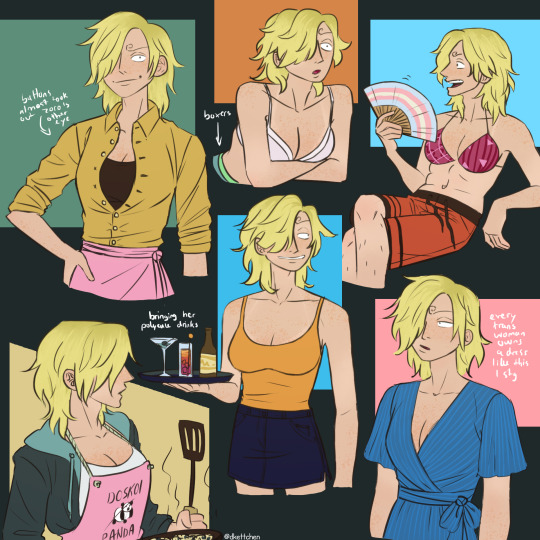
I am obsessed with her
#sanji#one piece#trans!sanji#trans#please enjoy the tiddies I've been drawing all week#she is canon sanji bone sized#this is the most accurate simulation of what a post-E sanji would look like#even oda wouldn't be able to get it this correct#seeing as he doesn't know about transgender bones#depending on the reference image I was using I actually had to *give her more chin* bc again canon sanji is a tiny twink baby
790 notes
·
View notes
Note
If you do Bingyuan prompts:
Bingge discovering/realizing that his children’s beloved head teacher is the friendly Shizun from the other world would be a delight!
(Shen Yuan with a miniature army of tiny heavenly demon children who adore him is just super cute!)
By the age of twenty-five, Luo Binghe possessed—or thought he possessed—all the wealth and treasures in the world that a man could want. His vengeance upon the Cang Qiong Mountain sect was complete, the mountain range burned and its peak lords slain but for the master of Qian Cao Peak and Qi Qingqi, whom he had spared for Liu Mingyan’s sake—and he had long since established himself as Emperor of the demon realm, with no small amount of influence in the world he was born to by virtue of his marriage to the Little Palace Mistress, Hua Zhihan.
But then—half-way through his twenty-seventh year, and three years after the construction of his great fortress close to Huan Hua Palace—he stumbled through a rent in the very skin of the world and found himself back upon Qing Jing Peak, cradled in the arms of a man who wore the face of Luo Binghe’s hated shizun.
He had hardly been there an hour before he discovered that that Shen Qingqiu had been nothing like the jealous fiend who tormented Luo Binghe in his youth. On the contrary, he had welcomed Luo Binghe into his home and bed like a new bride reuniting with her husband at the end of a long day’s work; and for several months after Luo Binghe returned to his own palace in the demon realm, he found no satisfaction in his endless riches, or the tens of wives in his harem.
He spent a full season hunting for that Shen Qingqiu in his own world afterwards, for he knew somehow that the living Shen Qingqiu who had married the other Luo Binghe and his own former Shizun were not one and the same. The Shen Qingqiu Luo Binghe knew had nothing in common with that man other than his face, and even that had been so altered by the spirit living behind it that Luo Binghe had not recognized him as Shen Qingqiu at first sight; but the other Luo Binghe reminded him a great deal of his own child-self, and how single-mindedly he had loved Ning Yingying in those early days at Cang Qiong.
But years went by, and Luo Binghe found nothing—no shadow or trace of that gentle Shen Qingqiu, whether living or dead—and at last, he drank himself sick on dragon-blood wine and unburdened himself to Ning Yingying, confessing that nothing under the sun had brought him joy since that one jewel-bright day with Shen Qingqiu three summers earlier.
Of course, he did not breathe a word about what had actually happened—for Yingying and the others believed that the strange, bewildered husband who stumbled into the hougong that day was none other than Luo Binghe himself, and he had never seen fit to disabuse them of the notion—but she seemed to understand that the better part of his life’s joy had left him, and said:
“A-Luo, if we sisters can’t make you happy as we used to anymore, do you think—do you think a child might make you happy? We’ve been married for nearly ten years, and I hoped…”
Luo Binghe thought for a moment, still dizzy from the six pots of wine he drank with his evening meal; and amid the soft haze clouding his thoughts, he realized that he would have died of envy if the poor imitation of himself from the other world had had a child with his Shen Qingqiu.
But the only children he had seen on Qing Jing Peak that day were a handful of young disciples in their early teens, far too old to belong to that pitiful Luo Binghe. It struck him that this was something that other Luo Binghe could never have—must never have, lest Luo Binghe know what had happened and find his way back to that dream-world to quell his jealousy by ripping his other self limb from limb—and then—
“It might not be a bad idea,” he heard himself say. “What about Yingying? Would you like a child?”
“Very much,” Yingying whispered, taking Luo Binghe’s hand.
Their first daughter, Suoxin, was born the next year; and when the head taiyi placed her in Luo Binghe’s arms, a tiny mote of the tumult in his soul grew calm, and never returned to trouble him again.
The birth of Suoxin’s younger sister Changying followed exactly a hundred days later, for Hua Zhihan had demanded a child of her own as soon as she heard that Ning Yingying was pregnant, and Luo Binghe saw no reason to refuse her. Several of his lesser wives had attempted to follow suit, but he was adamant that no children should be born to them until the children born of his five chief wives had safely reached the age of about three or four: especially after the tragedy that accompanied the birth of Luo Binghe’s first son.
The taiyi later discovered that his mother—Qin Wanyue, who had suffered a miscarriage at Sha Hualing’s hands some six years earlier—had been born with a deformation in one of the chambers of her heart; and due to her general good health and the strengthening effects of her cultivation, Wanyue never noticed it. But her cultivation was not sufficient to protect her from the strain of childbirth; and scarcely five minutes after the baby took his first breath, Qin Wanyue drew her last, dying without knowing anything more of her child than a single, snatched glimpse of his small red face.
The infant was given the name Luo Nianzu, in remembrance of his mother, and handed over to Liu Mingyan to raise. Mingyan had not wanted a child of her own, though she was more than willing to bring Nianzu up in Wanyue’s stead.
And in the wake of Qin Wanyue’s passing, Luo Binghe vowed to himself that he would never sire another child. He had been the instrument of her ruin, wittingly or not: and with three healthy heirs, of whom one was a boy, he refused to risk a second death in the harem.
But his resolve had not hampered Sha Hualing’s plans: and in truth, Luo Binghe should have known better than to expect otherwise. One night, she took Xin Mo from the stand beside his bed and stabbed Luo Binghe straight through the shoulder—rather more ferociously than usual, he thought—and absconded from the palace with three phials full of his spilt blood, returning a fortnight later with a fat baby boy swaddled in one of her own silk veils.
“Did you give birth to him?” Luo Binghe frowned, after he tasted the child’s blood mites and found that they were nearly identical to his own. “You were only gone for two weeks.”
Sha Hualing only laughed at him, and asked that he give their son a name. Luo Binghe named him Shunlei, with the shun for obedience and the lei for thunder; and though Hualing took the hint at once, she was so well-pleased with Shunlei’s name that Hua Zhihan spent the next month sulking about it.
The three years that followed Shunlei’s arrival were peaceful ones, for the demon realm had been brought to heel with Sha Hualing’s aid, and Mobei-jun grew more ruthless towards Luo Binghe’s enemies with every passing day. Yingying and Mingyan governed the harem both kindly and firmly, calming any disputes among the lesser wives and punishing those whose bids for favor put their sisters in danger; and they never faltered in their duty to the little ones, so that Luo Binghe went untroubled by the children’s needs until Liu Mingyan declared that Suoxin and Changying were old enough to begin studying with a trained taifu.
“I already have a candidate in mind,” she said to him over dinner one evening. “Will my lord permit me to look after the arrangements myself?”
“I don’t see why not,” Luo Binghe replied. “Do what you must. Only ensure that the taifu is well educated, and knows how to teach little children without frightening them.” One Shen Qingqiu was bad enough, after all.
And so, preparations went forth for the children’s education. Liu Mingyan wrote to the prospective taifu, who accepted the offer of employment and asked for a month to settle his affairs before moving to the palace; and Yingying began teaching Nianzu and Shunlei how to read, in the hope that the taifu would agree to instruct them alongside Suoxin and Changying.
Luo Binghe, having nothing further to do with the matter, left for the northern desert with Mobei-jun and Sha Hualing.
Linguang-jun had decided to rebel against his nephew’s rule again, and Luo Binghe was weary of indulging him. In the aftermath of Shang Qinghua’s betrayal, he and Mobei-jun had both decided that Linguang-jun’s continued existence was far more trouble than it was worth.
All told, he remained away from the palace for over two moons. When he finally returned, in midsummer, he went straight to his own courtyard and slept for three days without moving a muscle.
And then he awoke, and heard a soft strain of qin music issuing from the other side of the wall.
Luo Binghe froze.
That courtyard was meant to be empty; it had been empty since the day it was built, eight months after he met that other world’s Shen Qingqiu. Luo Binghe had filled its four rooms with books and bamboo furniture, and even the double bed in the inner chamber had been a replica of the one the other Shizun slept upon—and the courtyard’s little garden had a pavilion with a built-in table for a qin, since the construction of that Shizun’s house and garden made it plain that he liked to practice out of doors.
Who had dared set foot in that courtyard while Luo Binghe was absent?
Hua Zhihan? Qin Wanrong? Certainly not Yingying or Liu Mingyan; it resembled the living quarters at Qing Jing far too closely for either of them to find any peace there.
Trembling with fury, he pulled on the robes he was wearing last night and rushed over to the adjoining courtyard, where he stopped short at the threshold of its white-painted moon gate and gaped at the spectacle awaiting him within.
There was a man sitting at the qin table in the pavilion—a man, in the compound where Luo Binghe lived with his wives—playing a rearrangement of “Flowing Waters,” with Luo Shunlei on his lap. Suoxin and Changying were seated on either side of him, armed with child-sized guqins of their own, and Nianzu was nestled against the man’s shoulder, asleep.
And his face—
Luo Binghe had never seen such a face before. It was not the face of Shen Qingqiu—not the Shen Qingqiu he knew, at any rate—but the light in his eye and the warmth of his voice as he spoke to Suoxin were very like that Shen Qingqiu’s, though Luo Binghe noticed that there was a shade of difference between the two.
He is older, Luo Binghe realized at once, as his heart thundered inside him. The other Shen Qingqiu was young, judging by his manner—perhaps forty, at the very oldest—and my Shizun never even reached the age of fifty.
The other Shizun had worn green, he remembered. He preferred the same clean-cut style of dress that Luo Binghe’s shizun liked to wear, and of course their bodies and faces had been the same, as well; but this man wore s different face entirely, and his worn silk robes were a clean, stark white, like the garments of the wandering rogue cultivators who used to pass through Luo Binghe’s hometown when he was a boy.
The trappings of his flesh made no difference, however.
Luo Binghe knew him for what he was at first sight.
It struck him then that this must be the taifu Liu Mingyan selected for the children. He could not fathom why she would have housed an imperial tutor in the hougong, of all places: but now that he was here, Luo Binghe would rather walk through the Endless Abyss again than permit him to leave.
Luo Binghe could have stood in the doorway and stared at him for a lifetime; but then the taifu looked up and clambered to his feet, tugging the little girls along with him. Shunlei remained where he was, gripping the soft front of the taifu’s gown like a baby monkey clinging to its mother’s back; and Nianzu, securely balanced on the taifu’s hip, slept on without noticing that the man had moved at all.
“My lord,” the taifu said, bowing. “This humble servant offers his—”
“Xin’er greets Father!” Luo Suoxin cut in, glancing up at her teacher for approval. “Did I do it right, Shizun?”
“Yes, except for the part where you interrupted me first,” the taifu laughed. “Go on, Changying.”
Luo Changying nodded and stepped forward.
“Chang’er greets Father,” she said, rather more gracefully than Suoxin.
“Well done,” said the taifu. “Now, Shunlei…?”
Shunlei blinked and tightened his grasp on the taifu’s robes.
“A-Shun is hungry,” he complained, refusing to meet Luo Binghe’s eyes. “Shizun, snack time.”
Luo Binghe bit back a smile. This man was somehow more indulgent with his young charges than the other Shizun had been, and the sight of him holding Nianzu and Shunlei was so desperately sweet that Luo Binghe nearly reached out and touched him.
“Daozhang is the new taifu, I suppose?” Luo Binghe asked instead, taking another step forward. “Your name?”
The taifu nodded.
“This one is called Zhu Qinglan, my lord,” he replied, trying in vain to coax Shunlei down to the ground. “Now, A-Shun, my good little disciple…”
“Shunshun won’t look at him,” the baby insisted, his little voice muffled in the folds of Zhu Qinglan’s coat. “I want to eat cake, not see Fuqin.”
To Luo Binghe’s astonishment, Zhu Qinglan sat down on the steps below the pavilion and drew a wrapped package of sesame cakes out of his sleeve.
“Your imperial father has come back to see you after two months, and you act like this?” he chided, placing one of the cakes on Shunlei’s outstretched palm. “Now, eat your cake like a good child; and then you must get up and greet your father properly, like Xin’er and Chang’er.”
Luo Binghe lifted his hand.
“No need,” he said mildly, watching with half-crazed eyes as Zhu Qinglan stroked Luo Nianzu's fluffy hair. “Shun’er is always upset after this lord returns from his travels abroad. I do not see the children as often as I would like; but I try to dine with them at least once a week, and that little demon in your arms refuses to speak to me for days on end if I ever dare to arrive late.”
With that, he turned on his heel and swept out of the courtyard. He could not stand in Zhu Qinglan’s presence any longer, lest he do something that would terrify his children and turn their Shizun against him forever; and as it was, the little demon servant who brought breakfast to his quarters ten minutes later nearly died of fright at the sight of him.
“Zhu Qinglan,” Luo Binghe said to himself, after the petrified lackey made his escape. “The name suits him, whether it is a false one or no.”
He drained the last of his tea, and smiled.
“I’ve finally caught you, Shizun.”
#svsss#bingyuan#binggeyuan#the scum villain's self saving system#my fic#i live to serve and i have delivered#this is my first foray into multichapter svsss fic so please reblog if you liked it/would like to see more!#shen yuan's name is still shen yuan btw#we will unravel the backstory behind the name he's using Later#as well as some other.....backstory#;)
418 notes
·
View notes
Text

the star you've longed for
#PLEASE WATCH REVUE STARLIGHT!!!!!!💥💥💥💥💥#project sekai#revue starlight#pjsk#emu otori#nene kusanagi#emunene#prsk#proseka#yuri win. i make my fav pairing fight tothe death#HAPPY EMUNENE WEEK LOOOOOL#Can i be hinestni think this sucks it took way too long cause i forgot how to draw for a week#im seeing demons and stuff. i feel more normal now. Also you may recall emu has a big hammer for revstar#thats the bottom of it the gem thing all the weapons have hers is sharp#i remember seeing meta post abt how mahiru has a blunt weapon because she never actually aimed for the lead role#rather she only wanted to be by karen's side. so her weapon wasnt capable of cutting anything in the first place#Fastforward to the movie and well LOLLLLL#though i think its funny in the movie her mace is still mostly used for i timidation againstbhikari.. bc again shes not winning for a lead#revue starlight youre neat. maybe i like revstar.#<- has been insane for 4+ years#Needed their pose to be smth where nenes weapon isnt visible because I DONT KNOW WHAT WEAPON TO GIVE HER. OOMFS HELP. I NEED A NENE WEAPON.#i thought some sort of polearm/spear/halberd etc something with range but that can be ambitious#but i feel like smth with that much footwork needed doesnt suit her.. And she cant hsve a sniper i dont think thatwould fucking work#aruru gets pistols in the revue but aruru also is Ummm well shes uhhh. [screaming] [car crash]#throwing knives would be funny wouldnt it. Put that gamer aim to use#idk if the emunene week tag is on here but i'll donit anyways#emuneneweek2024#i remembered to switch which account this pists to for the first time in like 3 pists. so you get to see all my tags this time#rather than accidentally posting it to the wrong account and having to dekete and repost andngoing IM NOT WRITING ALL THAT AGAIN.
200 notes
·
View notes
Text
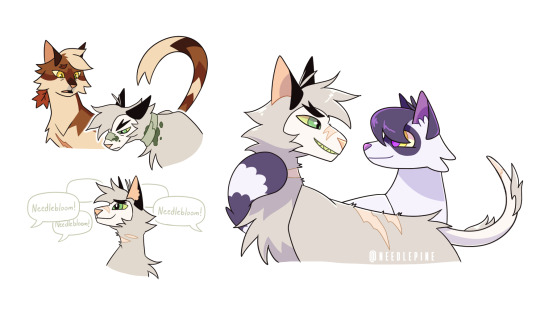
Do you ever think about. What if Needletail lived, asked to take the blame for all the cats who defected to the Kin, and was fully prepared to be exiled until Violetpaw begged Leafstar to let her join SkyClan. And then what if Leafstar mentored her and helped her become a better cat and gave her a new name to symbolize her growth
Yeah I think about that too
#heyyyyyy long time no see#would y’all like it if i posted doodles like this?#i doodle cats all the time but i get shy posting less finished stuff 👉👈#let me know please if i should post more like this!#warriors#warrior cats#needletail#violetpaw#violetshine#leafstar#leafdapple#shadowclan#skyclan#the kin#cat art#needlebloom au#au
1K notes
·
View notes
Text
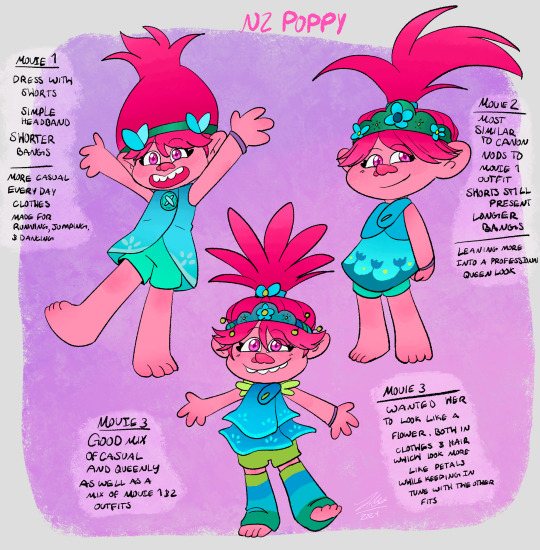
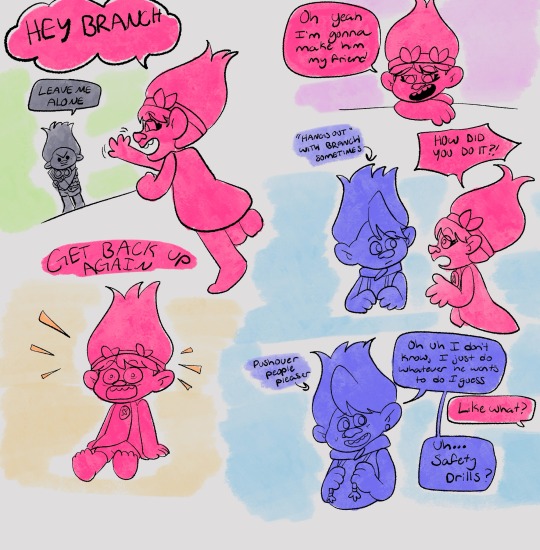

Poppy for N2 au, it took me so long to make her design cuz I didn't really know what I wanted to do only because I feel like her design is pretty perfect.
But then I just thought about fun outfits to give her or outfits that I would find comfortable if I was wearing them and it all came together.
Poppy here is pretty much the same as here movie counterpart, as nothing really changes on her end of things other than having more insight on Branch through his brothers, and through Lief. Shes also a bit more understanding a bit earlier on because of it but it doesnt do much to change her own character arc I would say.
Bonus
Part of Poppys design was based off a design I had made for previous rulers of Troll Village/Tree
Namely Queen Protea who I designed as Poppys grandmother
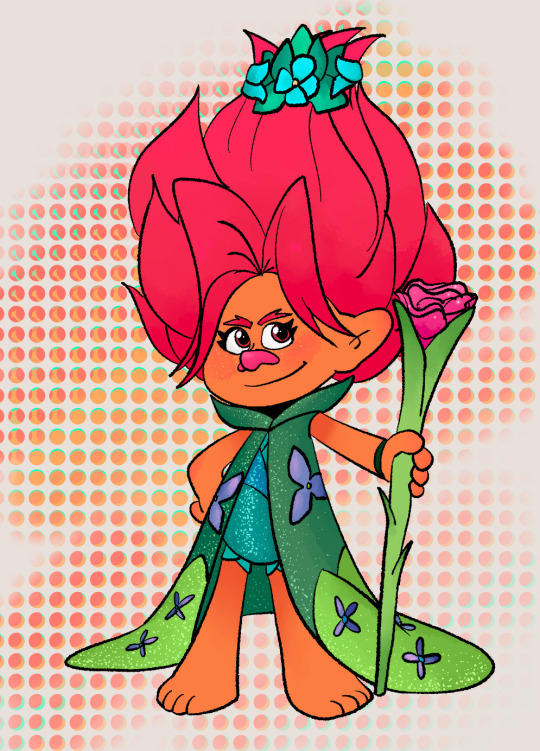
Named after the Protea flower which part of her design is based off :D
In the context of this Au Protea was the one who conceptualized the tunnels while her son, King Peppy, was the one to follow through after her death
#my art#dreamworks trolls#trolls#trolls 3#trolls au#trolls band together#trolls branch#trolls poppy#trolls oc#trolls oc lief#trolls oc protea#its really hard to mess with poppy at least in the context of this au cuz like i said nothing really changes on her end#whats changed in this au was just stuff on Branchs side of things#Poppy can witness these things but she herself isnt really changed by them#she of course would have more insight on Branchs life through his brothers and the addition of Lief as a character#but idk if that would fully change her approach with him other than what ive displayed#where shed try to relate to branch rather than trying to force him to relate to her#which would then most likely make her more understanding going forward than she was in canon#im still figuring her out#also since im in the tags and nobody really reads this#i feel brave enough to say#that secretly#ive been kind of sort of#posting a fanfic of this au under the name not the only one#on ao3#and thats where Protea comes from#its not well written in the slightest#but its just for fun and practice so in my mind it doesnt really have to be entirely#but i am having fun with it#so if you see this and check it out please be so very nice to me please
174 notes
·
View notes
Text
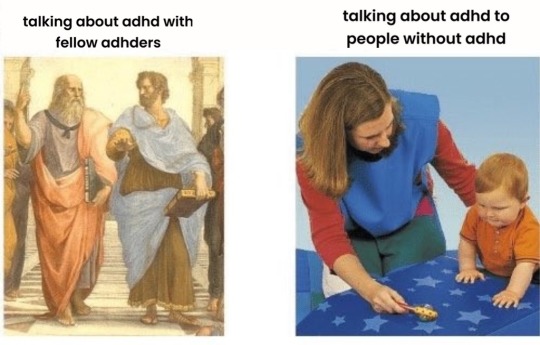
genuinely how i feel sometimes
#adhd#NOBODY TAKES IT SERIOUSLY EXCEPT PPL WHO ALSO STRUGGLE WITH IT ITS SO FRUSTRATING#kitty needs to chill#neurodivergence#neurodiversity#add#actually adhd#actually add#if i see one more person acting like adhd isn’t an actual debilitating neurological disability#i’m going to fucking scream and no one can stop me#i also would like to point out i said ‘ppl without adhd’ and not ‘neurotypicals’ for A Reason#bc i see some fellow neurodivergents acting like adhd is just…. not a thing#or not as ‘bad’ as other neurodivergencies#or maybe not as impactful would be a better term#and if you’re going to tag this as ‘me but with [other thing]’ please just make your own post
478 notes
·
View notes
Text
kia ora! i would like to suggest the coining of a term that would hopefully help a large demographic of mostly-forgotten-about māori to connect with each other and share our experiences to feel less alone, congregate around a concept regardless of country of origin and upbringing, and organise as activists.
i politely ask as many people to spread this as possible to help indigenous people organise with each other and to get the largest amount of interactions possible.
anyway, with all that being said,
i would like to coin the term "ngāti rangiātea" for māori who do not know their iwi to use.
this is based on the well known whakataukī/proverb, "i will never be lost, for i am a seed which was sown from rangiātea." i chose this whakataukī due to the spiritual significance of rangiātea as a place in māori culture, as well as to emphasise that no matter how it feels, we are not lost, we can find ourselves in each other, we can experience strength and self-realisation, and that we will exist with mana and without whakamā as rightful tangata whenua.
i've put my reasoning, personal experiences shaping my viewpoints on the matter, and various statistics under the cut to make this post reblog-friendly and i would suggest fellow māori read it regardless of whether or not they know their iwi. i also ask for the opinions of other māori, ESPECIALLY AND SPECIFICALLY other māori who do not know their iwi. in fact, i politely ask māori to share this with their whānau and people in general to share this with māori they know, especially any they know who do not know their iwi. a wide reach is what i am going for to get the largest amount of voices, critiques, and opinions on the topic and to avoid this from just becoming a very small thing that stays in an online echo-chamber.
to begin, the 2018 aotearoan census shows that, of the 775,836 people identifying as māori in aotearoa, roughly 17% are unable to identify their iwi in the census. this has gone up by 1% since 2006, showing that we are a considerably stable percentage of people. along with this, there are more than 170,000 māori living in australia and, while there are no solid statistics, there are an estimated 8,000 māori living in the UK, 3,500 in the US, 2,500 in canada, and 8,000 in other countries where there's no option for māori or any polynesians on the census.
this number adds up to 967,816 total māori and while there's no census in these countries asking for your iwi, i would go as far as to assume that there's a larger number of diaspora māori who are no longer able to identify their iwi than there are in aotearoa. of course, this is just speculation based on my lived experiences and conversations with other diaspora māori, however even assuming that it's the exact same amount globally, 17%, this is roughly 164,532 māori worldwide who do not know their iwi. nearly one in five māori do not know their iwi.
regardless of the specific statistics, the hard fact here is that there is a large percentage of māori who are unsure of their iwi for whatever reason. it's extremely easy to feel unsure of yourself, lost, disconnected, and uncomfortable speaking on issues regarding te ao māori when you're unsure of your iwi (or your hapū, whānau, waka, or anything else, but there is heavy emphasis on the iwi) and it's very easy for whakamā to take hold, especially when many māori who can recite their whakapapa aren't very polite or understanding about your situation to say the least.
and there are a lot of those people.
unfortunately, i've spoken to many māori who are of the opinion that not knowing your iwi due to colonialism, assimilation, forced disconnection, etc. means that you should not, cannot, call yourself māori. this is a disgusting viewpoint to have and in my opinion it spits on the fundamental concepts of māori culture and worldviews. thankfully this is a small yet vocal group of people, but even so, they add to the collective experience that makes it extremely difficult to navigate a world while full of whakamā and internalised racism. it can feel like there's no space for you, no term you can use, nobody you can relate to, no mana you can claim, nothing. when you cannot recite your whakapapa, it can feel like there's a part of you that's fundamentally missing.
as well as this, even when people mean well, when you are in this situation, you're usually told to just do some genealogy work, do some research, ask your family what they know. sometimes, these steps are simply not possible. other times, we've already done everything suggested over and over and over again. we're generally told "oh, that sucks, but one day you'll find out, keep looking!" in response to our lack of iwi. sure, they mean well, but i have never once been told anything along the lines of "that's okay, some things are lost to time through no fault of your own. don't beat yourself up over something your whānau had to hide to survive, what you do now to uphold your family's mana, what you do know about your whānau, and who you ultimately become is more important than what you no longer know."
and why? why is it seen as shameful to say matter-of-factly that i don't know my iwi? i'm not looking for comfort, i'm not looking to be told that, aww, there there, i'll find it eventually. i'm stating a fact. i do not need pity, i need my mana and voice to be respected.
this concept is what i want to emphasise by coining ngāti rangiātea. some things are lost to time, but we aren't. our loss of knowledge does not mean that we are unworthy of being māori, that we are unworthy of basic human respect. it does not mean that we have lost everything that our whānau knows. it is a scar, a reminder of what colonisation took from us, yes, but we cannot allow it to continue to be an open bleeding wound. we will not be lost to time and we should not bow our heads and act like we do not exist, that we're inconvenient, that we damage the "image" that māori have. in fact, we are an important aspect of māori culture and ignoring our existence does harm to everybody.
and of course we can't speak on some topics regarding te ao māori. this seems to be a topic that comes up frequently as a strawman. yes, there are some topics that would be irresponsible to speak on when we have no experience with them. this doesn't mean we can't speak on anything. having a collective identity, an "iwi" to congregate around even just politically, would help us speak on topics that we are more qualified to speak on than māori with knowledge of their iwi (yes, those topics exist, shockingly.)
we will never be lost, for we are a seed sown in rangiātea.
by identifying as ngāti rangiātea, i wish to emphasise that it's important to accept that sometimes, someone just won't be able to find every piece of information. loss of family knowledge is literally one of the primary goals of forced assimilation! we all went through it as colonised peoples, why must we continue to attach shame to those of us who were forced to obfuscate our history to keep our children alive? it's not a personal flaw, it's not a dirty secret, it's a fact of life that must not continue to be kept quiet out of shame, and the sooner we can focus on healing this subsection of our community, the stronger māori as a whole will become.
so, this is why i'd like to coin a term for māori who are unsure of their iwi. this is what i intend to achieve by giving us a name, our own "iwi" to congregate around, to identify ourselves as. instead of hanging my head and saying "i'm not sure what my iwi is, i'm sorry", instead of feeling inclined to beg like a dog to be treated with respect, i would like to look people in the eye and tell them that i am ngāti rangiātea. i would like this label to be synonymous with strength and not shame, that i refuse to let my whakamā swallow me, that i am just as worthy of calling myself māori as anyone else, that there are many others in my iwi (or lack thereof). i would like other people to have that as well and i would like those like me to feel less lost when all they've been told is "well, you'll learn your iwi eventually!" as if that's going to help someone feel better if they can't find their iwi.
and even if a person finds their iwi eventually, it's absolutely disgraceful that people are treated that they're not allowed to access many basic parts of te ao māori until they discover something they are not even 100% destined to find. i think that this view contributes to a lot of people who eventually find their iwi becoming unnecessarily arrogant towards those who truly cannot find this information, that they're just not putting enough effort in. if a person finds their iwi after identifying as ngāti rangiātea, they are fully welcome to continue to identify as this political label along with the iwi they now know they belong to as i wish for it to be a term that describes your experiences, your upbringing, and your community. you don't suddenly lose your whānau or your lived experience when you discover your whakapapa.
finally, this hopefully goes without saying, but ngāti rangiātea is not meant to function as a real existing iwi does. the term will hopefully be used as a way to identify yourself and other people and organise but i don't expect nor do i want this to be treated like a coordinated iwi. i expect and hope for this to be a decentralised way of identifying and experiencing community to make it easier to organise as a people. think of this the way the terms ngāti kangaru, ngāti rānara, ngāti tūmatauenga etc. are used.
-----
so, the tl;dr is that i feel like coining a name for a phenomenon that nearly one in five of all māori experience in quiet shame, to make it easier for us to congregate and find each other, speak on our experiences, organise as activists, feel less lost, and ultimately give us the ability to regain our mana as a community with shared goals and experiences. i have spoken to many māori who feel this way and my suggestion for this term is ngāti rangiātea, to show homage to the well known whakataukī, "i will never be lost, for i am a seed sown from rangiātea", to give us a community to work with, and to give us an "iwi" to list when asked instead of fumbling for words and feeling whakamā.
i would like to take the emphasis off of constantly looking to the future for what you may or may not even find with this identity. we are not broken, we are not lost, for we are seeds sown in ngāti rangiātea.
tēnā koutou, tēnā koutou, tēnā tatou katoa, and if you got this far, thank you for reading.
#maori#māori#pasifika#indigenous#indigenous issues#polynesia#aotearoa#aotearoa new zealand#new zealand#tangata whenua#new zealand politics#politics#i was considering calling it smth along the lines of ngāti whāngai to represent that we would be whānau from different paths and family#but ngāti rangiātea felt more succinct and meaningful. particularly with how it's very easy to feel lost when you're unsure of your iwi#please boost this even if you're not māori as i'd like as many people to see as possible <3#anyway i'm quite nervous and i hope this doesn't come across like i'm trying to be any kind of authority haha#i just feel like this is an extremely important topic that affects many people but is rarely spoken about for various reasons#ngāti rangiātea
365 notes
·
View notes
Text
the Sully kids' reaction to Jake saying Spider "knew everything" breaks my heart.
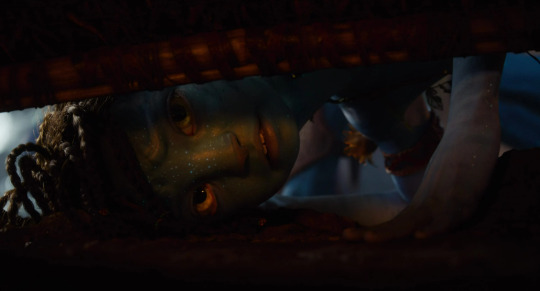





they knew him better than anyone else, better than their parents. they knew his love for Eywa, for Pandora, for The People, for the clan, for their family. they knew he would never tell the RDA anything... not willingly at least.
they knew they were leaving because Spider would be tortured for information, he'd be forced to reveal their home, their plans, their numbers, their weaknesses. their brother would be tortured and they were being forced to leave him behind.
they knew they were being forced to find a new home, without their brother, because their dad knew he would be tortured.
#I like to think. for the sake of my sanity. Jake knew Spider would be loyal to them. that he would only blab once broken by torture.#anything else would kill me. the level of anger would be lethal.#but regardless. I think the kids would also need to believe the same thing. they *need* to think their dad has faith in their brother.#but back to the reactions themselves. the heartbreak and confusion on Kiri and Tuk's face. the way Lo'ak looks dissociated.#we can barely even see his face. but even Neteyam looks surprised and painted. even if its kept under a calm guise#(I will never let anyone convince me 'tey didn't love Spi. James. give us more about them please. more than these little crumbs)#they were just little kids and he was their big brother#he was Lo'ak and Kiri's best friend#Tuk was his baby#I feel it in my bones that Spi and 'tey were brothers with a complicated history. I know 'tey was scared to lose him.#I don't have proof but I know James is cooking up something with them#they would never believe Spider would just give them up. but that opens up their minds to so many things to think about#they had to be so scared for him and angry he was being left behind#(especially since in the comics Kiri. Lo'ak. and Tuk risk their lives to save him when he was kidnapped by Nash)#avatar 2#avatar the way of water#spider socorro#miles spider socorro#miles socorro#kiri sully#lo'ak sully#tuk sully#tuktirey sully#neteyam sully#lo'ak#kiri#tuk#tuk tuk#tuktirey#neteyam
124 notes
·
View notes